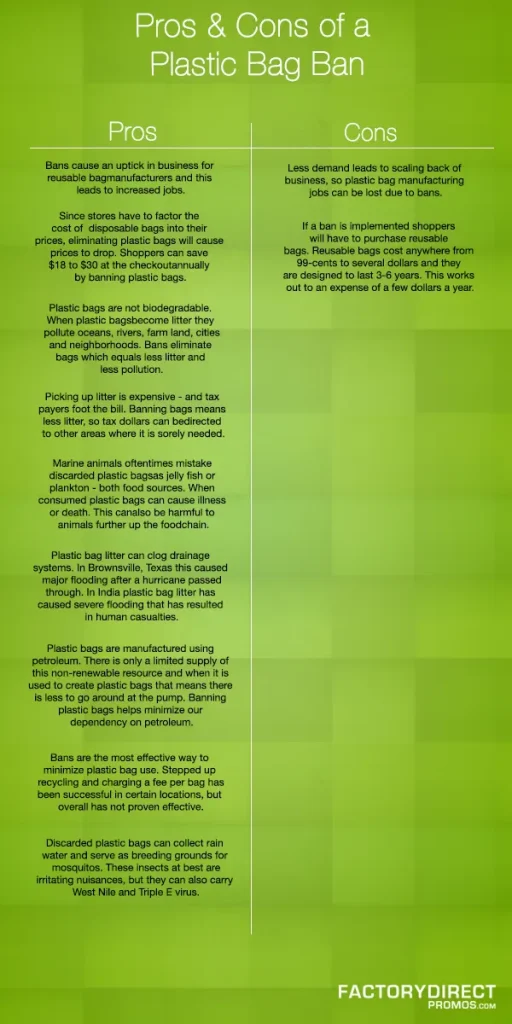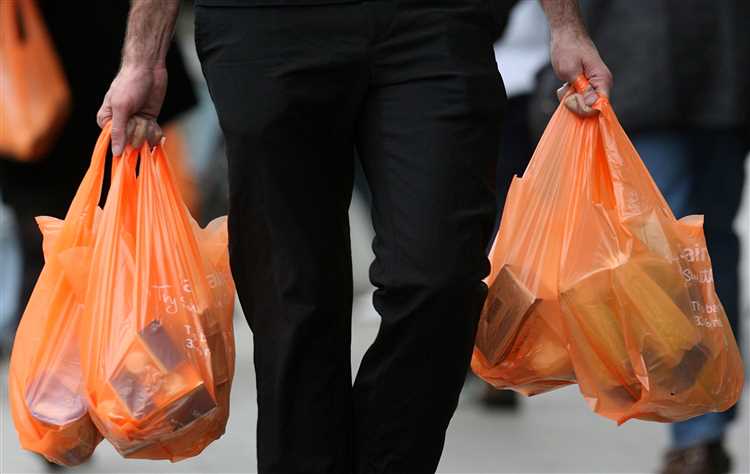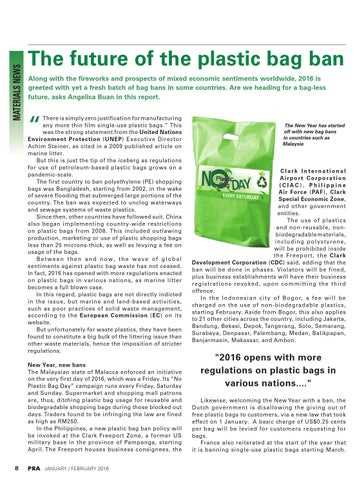In recent years, there has been a growing global concern about the environmental impact of plastic bags. Many countries, cities, and communities have taken action by implementing plastic bag bans in an effort to reduce pollution and protect the planet. However, the future of these bans is still uncertain, and it is important to consider what we can expect in the coming years.
Plastic bag bans have already proven to be effective in reducing plastic waste and promoting sustainable alternatives. By prohibiting the use of single-use plastic bags, communities have seen a decrease in litter and marine pollution. Additionally, the bans have encouraged individuals to adopt more eco-friendly habits, such as using reusable bags or opting for paper bags.
As the movement to ban plastic bags gains momentum, it is likely that we will see more cities, states, and countries join in the effort. Governments and organizations worldwide are recognizing the importance of reducing plastic waste and are taking action to address the issue. It is anticipated that more stringent regulations may be put in place, such as increasing the fees for plastic bags or expanding the ban to include other types of single-use plastics.
However, there are also challenges that lie ahead. The implementation and enforcement of plastic bag bans can be complex, especially in regions where the use of plastic bags is deeply ingrained in consumer culture. Education and awareness campaigns will be crucial in ensuring that individuals understand the rationale behind the bans and are motivated to change their behaviors. Additionally, alternatives to plastic bags, such as reusable bags or biodegradable options, need to be readily available and affordable for consumers.
In conclusion, the future of plastic bag bans holds promise for a more sustainable and environmentally conscious future. While challenges exist, the global movement to reduce plastic waste is gaining traction, and it is likely that we will see more widespread bans and regulations in the coming years. By embracing reusable alternatives and supporting the transition away from single-use plastic bags, we can all contribute to a cleaner, healthier planet.
- Environmental Impact of Plastic Bags
- Current Plastic Bag Bans: An Overview
- Global Efforts to Reduce Plastic Bag Usage
- 1. Bag Bans and Taxes
- 2. Promoting Reusable Bags
- Alternative Solutions to Plastic Bags
- 1. Reusable Bags
- 2. Paper Bags
- Q&A:
- Will plastic bag bans become more common in the future?
- What are the alternatives to plastic bags?
- Are there any drawbacks to plastic bag bans?
- What is the economic impact of plastic bag bans?
- How effective are plastic bag bans in reducing plastic waste?
- What are plastic bag bans?
- Why are plastic bag bans being implemented?
Environmental Impact of Plastic Bags
Plastic bags have been a staple of the retail industry for decades, providing a convenient and lightweight option for carrying purchases. However, their convenience comes at a significant environmental cost. Plastic bags are not biodegradable and can take hundreds of years to break down in the environment.
One of the biggest environmental concerns with plastic bags is their impact on wildlife. Animals can easily mistake plastic bags for food or become entangled in them, leading to injury or death. Marine life, in particular, is vulnerable to the dangers of plastic bags, as they can mimic the appearance of jellyfish and be consumed by marine animals.
Furthermore, the production of plastic bags requires the extraction and refining of fossil fuels. This process contributes to greenhouse gas emissions, which contribute to climate change. In addition, the manufacturing of plastic bags releases harmful chemicals and pollutants into the air and water, further degrading the environment.
In terms of waste management, plastic bags are a significant contributor to the global plastic waste problem. They often end up in landfills or become littered in the environment. Even when disposed of properly, plastic bags can easily be carried by wind and water, ultimately reaching bodies of water and contributing to plastic pollution.
To mitigate the environmental impact of plastic bags, many countries and cities have implemented plastic bag bans or imposed fees on their use. These initiatives encourage the use of reusable bags and promote sustainable alternatives like paper or cloth bags. They aim to reduce the production and consumption of plastic bags, ultimately reducing their environmental footprint.
- Plastic bags are not biodegradable and can take hundreds of years to break down in the environment.
- Plastic bags can be mistaken for food by animals, leading to injury or death.
- The production of plastic bags contributes to greenhouse gas emissions and the release of harmful chemicals and pollutants.
- Plastic bags are a significant contributor to the global plastic waste problem.
- Many countries and cities have implemented plastic bag bans to reduce their environmental impact.
Current Plastic Bag Bans: An Overview

The movement to ban plastic bags has gained momentum in recent years, with many cities and countries around the world implementing restrictions on their use. These bans are a response to the growing concerns about the negative environmental impact of single-use plastic bags.
Plastic bags are known for their contribution to pollution, particularly in marine environments. They can take hundreds of years to break down, and in the meantime, they can harm wildlife and pollute waterways. Additionally, the production of plastic bags requires significant amounts of fossil fuels and emits greenhouse gases.
As a result, various jurisdictions have taken steps to reduce or eliminate the use of plastic bags. Many cities have implemented outright bans on plastic bags, while others have imposed taxes or fees on their usage. In some cases, only certain types of stores, such as grocery stores or pharmacies, are restricted from providing plastic bags.
Despite the pushback from some businesses and consumers, the evidence suggests that plastic bag bans can be effective in reducing plastic waste. In countries where bans have been implemented, there has often been a significant decrease in plastic bag usage, leading to cleaner environments and reduced plastic litter.
However, the effectiveness of these bans can vary depending on factors such as public awareness, enforcement, and the availability of alternative options. Some communities have experienced challenges with compliance and have faced backlash from individuals who view the bans as an inconvenience.
While plastic bag bans are an important step towards sustainable practices, they are not a silver bullet solution. Efforts to reduce plastic waste should also include educating consumers about the importance of reusable bags, promoting recycling programs, and encouraging the development of eco-friendly alternatives to plastic bags.
Overall, the current landscape of plastic bag bans is diverse, with different approaches being taken in various regions. As the movement continues to grow, it is likely that more cities, states, and countries will implement measures to reduce reliance on single-use plastics and protect the environment for future generations.
Global Efforts to Reduce Plastic Bag Usage
Plastic bags have become a significant environmental issue, as they are not biodegradable and can take hundreds of years to break down. In response to this problem, many countries and local communities around the world have implemented measures to reduce the usage of plastic bags.
1. Bag Bans and Taxes

One of the most common approaches to reducing plastic bag usage is the implementation of bag bans or taxes. Several countries, including Ireland, France, and Italy, have banned or heavily taxed single-use plastic bags. These measures have been effective in reducing plastic bag usage and encouraging the use of reusable alternatives.
2. Promoting Reusable Bags
Another global effort to reduce plastic bag usage is the promotion of reusable bags. Many governments and organizations have launched campaigns to encourage individuals to switch to reusable bags for their shopping needs. This includes distributing free or discounted reusable bags, educating the public about the environmental impact of plastic bags, and partnering with retailers to promote the use of reusable alternatives.
In addition, some countries have introduced legislation that requires retailers to charge customers for plastic bags, further incentivizing the use of reusable bags.
Overall, global efforts to reduce plastic bag usage are gaining momentum, with more countries and communities recognizing the need to address this environmental issue. By implementing bag bans, taxes, and promoting reusable alternatives, we can make significant progress in reducing plastic waste and protecting our planet.
Alternative Solutions to Plastic Bags
In recent years, there has been an increasing focus on finding alternative solutions to plastic bags. As concerns about the environmental impact of plastic waste continue to grow, many countries and cities are implementing bans and restrictions on single-use plastic bags. Here are some of the alternative solutions being explored:
1. Reusable Bags

One popular alternative to plastic bags is the use of reusable bags made from materials such as cotton, canvas, or jute. These bags can be used multiple times and are often sturdier than plastic bags, making them a more sustainable option. Many grocery stores and retailers now offer reusable bags for sale, and some even provide incentives for customers to bring their own bags.
2. Paper Bags
Another alternative to plastic bags is the use of paper bags. While paper bags are not as durable as plastic bags, they are biodegradable and can be recycled. Some cities have implemented bans on plastic bags and require retailers to provide paper bags or charge a fee for their use. It is important to note, however, that the production of paper bags can also have environmental impacts, as it requires the cutting down of trees.
| Pros | Cons |
|---|---|
| Reusable bags are more durable and can be reused multiple times | Can be more expensive than plastic bags |
| Paper bags are biodegradable and can be recycled | Production of paper bags can contribute to deforestation |
While reusable and paper bags are popular alternatives, they may not be suitable for all purposes. Some products, such as meats or liquids, require more durable and leak-proof packaging. In these cases, other alternatives like biodegradable plastic bags made from plant-based materials or compostable bags may be more appropriate.
As the conversation around plastic bag bans continues, finding the most effective and sustainable alternative solutions will be key. It is important for individuals, businesses, and governments to work together to reduce plastic waste and protect the environment for future generations.
Q&A:
Will plastic bag bans become more common in the future?
Yes, plastic bag bans are likely to become more common in the future. Many countries and cities have already implemented such bans due to the negative environmental impact of plastic bags.
What are the alternatives to plastic bags?
There are several alternatives to plastic bags, including reusable cloth bags, paper bags, and biodegradable bags made from materials like cornstarch. These alternatives are more environmentally friendly and can help reduce plastic waste.
Are there any drawbacks to plastic bag bans?
While plastic bag bans have many benefits, there can be some drawbacks as well. For example, some people argue that reusable bags can harbor bacteria and pose health risks if not cleaned properly. Additionally, the cost of alternative bags may be higher for consumers.
What is the economic impact of plastic bag bans?
Plastic bag bans can have both positive and negative economic impacts. On one hand, banning plastic bags can create opportunities for businesses producing alternative bags. On the other hand, it may lead to job losses in the plastic bag manufacturing industry.
How effective are plastic bag bans in reducing plastic waste?
Plastic bag bans have been shown to be effective in reducing plastic waste. In countries and cities where bans have been implemented, there has been a significant decrease in the use of plastic bags and a corresponding decrease in plastic pollution.
What are plastic bag bans?
Plastic bag bans are laws or regulations that restrict or prohibit the use of single-use plastic bags. These bans aim to reduce plastic waste and encourage the use of more sustainable alternatives.
Why are plastic bag bans being implemented?
Plastic bag bans are being implemented to address the environmental impact of single-use plastic bags. These bags are not easily biodegradable and often end up in landfills or pollute the environment. By implementing bans, governments and communities hope to reduce plastic waste and encourage the use of reusable bags.